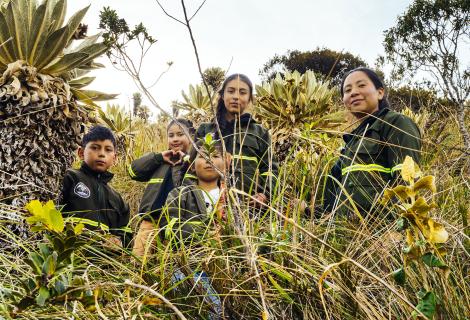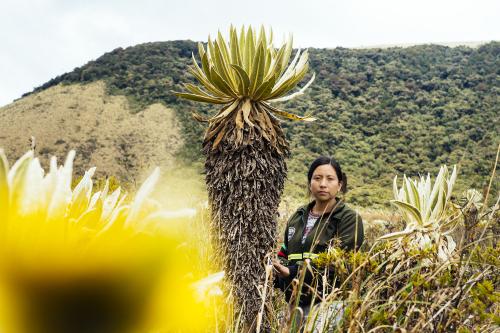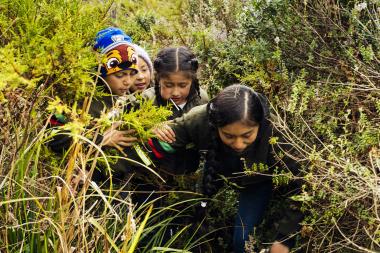The Indigenous Guard: protecting Colombia’s páramo

As we mark Nature, Land Use, and Oceans Day at COP28, it is important to tell the stories of those who are on the frontline of the climate crisis, working tirelessly to adapt to the impacts and protect the precious land.
Three generations of the Environmental Indigenous Guard in the Gran Cumbal region of Colombia tell their stories of working on the land and being part of a group that preserves this important territory.
The Environmental Indigenous Guard protect the páramo. The páramo is one of the world's most important eco-systems, nestled in mountains between the treeline and glaciers, and one of the fastest evolving eco-systems on Earth. Colombia is one of only three countries in the world that is home to a páramo.

Marisol Cuatin, a member of the Environmental Indigenous Guard says that,
“The Environmental Indigenous Guard is a non-profit organization of the Gran Cumbal indigenous reservation, composed of men, women, boys and girls whose aim is to protect the territory from an environmental and a security perspective.”
“We know the needs of the páramo and the problems we could face. In the case of forest fires, we are trained to go and fight them. When there is a natural disaster, like an avalanche in the winter, or an earthquake, we know how to help the community.”
Marisol has noticed the impact that the climate crisis is having on the páramo:
“What we knew as the cabañuelas, a method of forecasting the weather at the beginning of the year, doesn’t work anymore. It’s unreliable. For example, we have experienced drought almost all year. Winter just began this month. The impact that climate change has had on the territories is also noticeable in a negative way.”
“I think one of the most worrying things about climate change is what it means for our children’s future. There are many children who will not enjoy fresh air, safe drinking water and nature.”
“As the Indigenous Environmental Guard, we tell polluting countries it’s time for impactful actions to counteract their damage to the ecosystem. They should work jointly with various countries, especially Colombia, which is one of the most vulnerable nations in terms of climate change. Some of the joint solutions could be generating clean energy, ensuring food security for humanity, and sharing knowledge and science that contributes to the planet’s well-being.”

Marisol’s father founded the guard, and her mother is also a member. Luz Marina Cuatin tells us about belonging to the guard and what it means to her.
“I encourage my daughters and my granddaughters to continue serving in the Indigenous Guard to take care of our páramo, our fields, our waters and I teach them to love and value the environment. We are rural people, we have to talk about Mother Nature and have a sense of belonging and respect. We take care of everything that surrounds us, - Mother Nature.”
But Luz Marina is worried. She has seen how climate change has directly impacted the páramo:
“Everything is being affected, everything is destroyed. We are getting old but our grandchildren might suffer the most. I have seen many changes. I remember when I was a child our parents always took us to the mountain, and at that time the vegetation was very dense. The river had so much water that I was afraid to cross it. But now the water levels have gone down. It makes those of us who have beautiful memories of this place sad.”
Luz Marina’s granddaughter, Marisol’s, 7, is also a member of the guard. Maria has a message to the world leaders at COP28:
“I belong to the indigenous guard because I want to take care of the environment, take care of the water and the páramo. When I grow up, I still want to be an environmental guardian.”
“The message I want to give world leaders is to hold meetings and go to the páramo every day and take greater care of the Earth, or else our planet will be sad.”
ActionAid, alongside its partner Alianza por la Solidaridad, support groups like the Indigenous Environmental Guard and work with communities to train them on emergency-response skills.